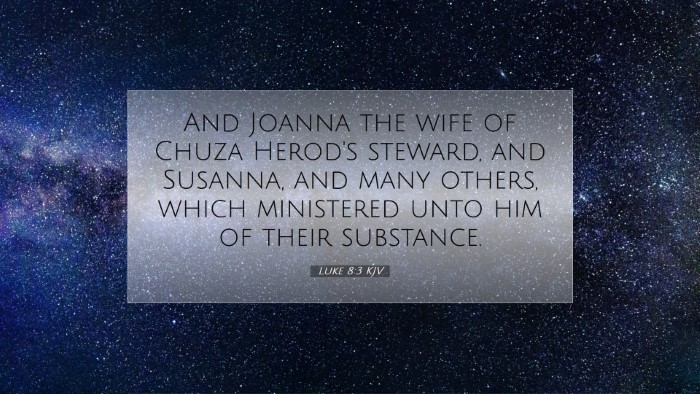Commentary on Luke 8:3
Bible Verse: "And Joanna the wife of Chuza, Herod’s steward, and Susanna, and many others which ministered unto him of their substance."
Introduction
In this passage, we find a brief yet profound insight into the role and contributions of certain women in the ministry of Jesus. Their support demonstrates the inclusive nature of Jesus’ ministry and highlights the importance of faithful stewardship, both in service and in substance.
Contextual Background
This verse occurs within the broader narrative of Luke 8, which discusses Jesus' ministry and the people who followed Him. The chapter opens with the mention of women who played a crucial role in supporting Jesus and His disciples. The identity of these women, particularly Joanna and Susanna, offers rich avenues for exploration concerning cultural norms, gender roles, and the social implications of their discipleship.
Insights from Commentators
Matthew Henry
Role of Women in Ministry: Matthew Henry emphasizes that the mention of these women highlights their significant and active participation in Jesus' ministry. It contrasts sharply with the often male-dominated leadership structure of the day. Henry notes that Jesus chose to honor their contributions, demonstrating that the kingdom of God is inclusive and does not adhere to societal exclusivities.
Stewardship of Resources: Henry points out that these women “ministered unto him of their substance.” This reminds the church today that spiritual support is not separate from material support; it is a holistic communion where believers are called to use their resources for the advancement of the Gospel.
Albert Barnes
Joanna's Notable Mention: Barnes highlights Joanna, the wife of Chuza, emphasizing her connection to Herod's steward. This connection suggests that she came from a place of privilege, indicating how the Gospel transcends social classes. Her transformation from a person of status to a servant of Christ exemplifies the transformational nature of faith.
Encouragement for All Followers: Additionally, Barnes remarks that the participation of various people in Jesus’ ministry serves as an encouragement to all believers. Regardless of status or background, every person has a role in the service of God's kingdom.
Adam Clarke
Historical Context and Social Dynamics: Adam Clarke provides insight into the historical context of the women mentioned. He explains that during the time of Jesus, women often had limited public roles. The fact that these women are named and recognized for their service is significant. Clarke suggests that this not only affirms their dignity but also serves as a radical shift in the societal norms of the era.
Spiritual and Material Contribution: Like Henry, Clarke emphasizes the dual aspect of ministry—both spiritual and material. He stresses that the women’s material support was vital for the sustainability of Jesus’ itinerant ministry, highlighting the ways in which faithful service goes beyond mere attendance to proactive participation.
Theological Reflections
The Nature of Discipleship: This verse challenges modern readers to reflect on their own understanding of discipleship. Discipleship involves more than following teachings; it includes a commitment to support.
The women in this passage exemplify a model of discipleship anchored in action and sacrifice.
Inclusivity in the Kingdom: The mention of women as key supporters of Jesus’ mission hints at the inclusivity of the Gospel. It conveys that God's call extends beyond traditional boundaries of gender, class, or status. This theme resonates throughout the Gospel of Luke and challenges the ecclesiastical status quo.
Application for Today’s Believers
- Support Jesus’ Ministry: Just as these women supported Jesus materially, believers today are called to support the ministry of the Gospel through their time, talents, and treasures.
- Embrace Diverse Roles: Every believer has a role in ministry, whether in leadership, service, or support. This passage encourages people to recognize their unique contributions.
- Honor Women in Ministry: The recognition of women like Joanna and Susanna serves as a reminder to honor and empower women in church leadership and ministry roles.
- Transformational Power of Faith: The change in the lives of these women from followers to supporters illustrates the transformative power of faith and serves to inspire believers to act upon their faith.
Conclusion
Luke 8:3 serves as a critical reminder of the roles women played in the ministry of Jesus, emphasizing their contributions and the love of Christ for all His followers. In the context of supporting Jesus through personal resources and active involvement, this scripture presents a foundational element of Christian stewardship and encourages a holistic approach to ministry. The commitment of Joanna, Susanna, and many others calls all believers to participate in the work of the Kingdom with their whole selves, continuing to support one another in faith.


